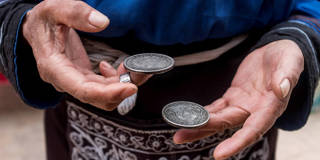In an age of rising new powers and new financial technologies, could the US dollar’s status as the global reserve currency finally come to an end? To answer such questions, it helps to adopt a historical perspective, because the future of money may well resonate with its deep past.
VITERBO, ITALY – We live in a time of unprecedented monetary innovation. Novel private monies like Bitcoin abound, because new technologies have made possible payment systems that bypass traditional banks. With the COVID-19 pandemic having expanded the frontier of “unconventional” monetary policies, central banks have been debating whether to create new digital currencies (CBDCs) of their own.
Never before has the future of money been more uncertain – and thus full of possibility. And yet a historical perspective can help us make sense of unfamiliar terrain, because the future of money may well resonate with its deep past.
I say “deep” past because it is important to look beyond the familiar notion of money that most people have. They imagine a national currency, issued solely by a state authority within territorial borders. In the United States, there is the dollar; in Japan, there is the yen; and in Europe, there is a great regional currency bloc. But this kind of money is a recent development, dating only to the nineteenth century, and arguably even later.

Akinobu Kuroda, A Global History of Money, Routledge, 2020.
VITERBO, ITALY – We live in a time of unprecedented monetary innovation. Novel private monies like Bitcoin abound, because new technologies have made possible payment systems that bypass traditional banks. With the COVID-19 pandemic having expanded the frontier of “unconventional” monetary policies, central banks have been debating whether to create new digital currencies (CBDCs) of their own.
Never before has the future of money been more uncertain – and thus full of possibility. And yet a historical perspective can help us make sense of unfamiliar terrain, because the future of money may well resonate with its deep past.
I say “deep” past because it is important to look beyond the familiar notion of money that most people have. They imagine a national currency, issued solely by a state authority within territorial borders. In the United States, there is the dollar; in Japan, there is the yen; and in Europe, there is a great regional currency bloc. But this kind of money is a recent development, dating only to the nineteenth century, and arguably even later.